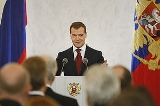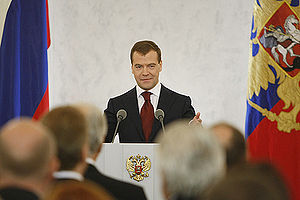
2008 Amendments to the Constitution of Russia
Encyclopedia
The amendments of 2008, which were proposed in November 2008 and came into force on 31 December 2008, have become the first substantial amendments to the Constitution of Russia
of 1993 and extended the terms of the President of Russia and the State Duma
from four to six and five years, respectively. Earlier only minor adjustments concerning the naming of the federal subjects
or their merging were made, which require a much simpler procedure.
 President Dmitry Medvedev
President Dmitry Medvedev
, who succeeded Vladimir Putin
earlier that year, made that brief proposal during his first annual address to the Federal Assembly
on 5 November 2008:
The change doesn't apply retroactively and shouldn't affect the current terms of the President and the State Duma and will take effect for the next time. As of 2008, the articles 81.1 and 96.1 of the Constitution of 1993 stipulated that the President and the State Duma should be elected for a term of four years. According to the articles 136 and 108, amendments to the provisions of Chapters 3–8, including the articles 81 and 96, require the same approval as a federal constitutional law, that is, a two-thirds supermajority
vote in the State Duma and a three-fourths supermajority vote in the Federation Council
, and come into force as they have passed the legislatures of no less than two thirds of the 83 federal subjects
.
The President formally submitted the bill to the State Duma on 11 November. The State Duma, dominated by pro-government parties after the election of 2007
, swiftly approved the proposal in the three required readings on 14 November (388 in favor/58 against), 19 November (351 in favor/57 against) and 21 November (392 in favor/57 against). Of the four parties represented in the State Duma, only the Communist Party
, represented by 57 members of parliament, opposed the bill. The United Russia
, Liberal Democratic Party
and Fair Russia
all supported the bill. Viktor Ilyukhin, a Communist legislator, commented during discussions in the State Duma on14 November:
The fractured democratic opposition outside the parliament also condemned the proposed changes to the constitution. On 26 November the Federation Council approved the bill with 144 votes in favor and one against.
Yulia Latynina
, journalist for the The Moscow Times
, speculated that the reform prefigures Vladimir Putin's return to the Kremlin, probably earlier than in May 2012, when Medvedev's term is set to expire. An unnamed official from the Presidential Executive Office cited by Vedomosti
hinted that Medvedev could resign as early as in 2009. According to Vedomostis source, the alleged plan was masterminded by Vladislav Surkov
in 2007. A survey held by VTsIOM on 15–16 November showed 56% support of a longer presidency and extended term of parliament among the Russians. The support, however, was lower in big cities.
By 18 December the legislatures of all 83 federal subjects of Russia had approved the amendments. The Federation Council reviewed and accepted the approvals on 22 December and on 30 December President Medvedev signed them into law. The amendments were published in Rossiyskaya Gazeta
and hence came into force on 31 December 2008.
Constitution of Russia
The current Constitution of the Russian Federation was adopted by national referendum on 12 December 1993. Russia's constitution came into force on 25 December 1993, at the moment of its official publication...
of 1993 and extended the terms of the President of Russia and the State Duma
State Duma
The State Duma , common abbreviation: Госду́ма ) in the Russian Federation is the lower house of the Federal Assembly of Russia , the upper house being the Federation Council of Russia. The Duma headquarters is located in central Moscow, a few steps from Manege Square. Its members are referred to...
from four to six and five years, respectively. Earlier only minor adjustments concerning the naming of the federal subjects
Federal subjects of Russia
Russia is a federation which, since March 1, 2008, consists of 83 federal subjects . In 1993, when the Constitution was adopted, there were 89 federal subjects listed...
or their merging were made, which require a much simpler procedure.

Dmitry Medvedev
Dmitry Anatolyevich Medvedev is the third President of the Russian Federation.Born to a family of academics, Medvedev graduated from the Law Department of Leningrad State University in 1987. He defended his dissertation in 1990 and worked as a docent at his alma mater, now renamed to Saint...
, who succeeded Vladimir Putin
Vladimir Putin
Vladimir Vladimirovich Putin served as the second President of the Russian Federation and is the current Prime Minister of Russia, as well as chairman of United Russia and Chairman of the Council of Ministers of the Union of Russia and Belarus. He became acting President on 31 December 1999, when...
earlier that year, made that brief proposal during his first annual address to the Federal Assembly
Federal Assembly of Russia
The Federal Assembly of Russia is the legislature of the Russian Federation, according to the Constitution of Russian Federation, 1993...
on 5 November 2008:
The change doesn't apply retroactively and shouldn't affect the current terms of the President and the State Duma and will take effect for the next time. As of 2008, the articles 81.1 and 96.1 of the Constitution of 1993 stipulated that the President and the State Duma should be elected for a term of four years. According to the articles 136 and 108, amendments to the provisions of Chapters 3–8, including the articles 81 and 96, require the same approval as a federal constitutional law, that is, a two-thirds supermajority
Supermajority
A supermajority or a qualified majority is a requirement for a proposal to gain a specified level or type of support which exceeds a simple majority . In some jurisdictions, for example, parliamentary procedure requires that any action that may alter the rights of the minority has a supermajority...
vote in the State Duma and a three-fourths supermajority vote in the Federation Council
Federation Council of Russia
Federation Council of Russia ) is the upper house of the Federal Assembly of Russia , according to the 1993 Constitution of the Russian Federation...
, and come into force as they have passed the legislatures of no less than two thirds of the 83 federal subjects
Federal subjects of Russia
Russia is a federation which, since March 1, 2008, consists of 83 federal subjects . In 1993, when the Constitution was adopted, there were 89 federal subjects listed...
.
The President formally submitted the bill to the State Duma on 11 November. The State Duma, dominated by pro-government parties after the election of 2007
Russian legislative election, 2007
Legislative elections were held in the Russian Federation on 2 December 2007. At stake were the 450 seats in the State Duma, the lower house of the Federal Assembly of Russia . Eleven parties were included in the ballot, including Russia's largest party, United Russia, which was supported by...
, swiftly approved the proposal in the three required readings on 14 November (388 in favor/58 against), 19 November (351 in favor/57 against) and 21 November (392 in favor/57 against). Of the four parties represented in the State Duma, only the Communist Party
Communist Party of the Russian Federation
The Communist Party of the Russian Federation is a Russian political party. It is the second major political party in the Russian Federation.-History:...
, represented by 57 members of parliament, opposed the bill. The United Russia
United Russia
United Russia is a centrist political party in Russia and the largest party in the country, currently holding 315 of the 450 seats in the State Duma. The party was founded in December 2001, through a merger of the Unity and Fatherland-All Russia parties...
, Liberal Democratic Party
Liberal Democratic Party of Russia
The Liberal Democratic Party of Russia , Liberal'no-Demokraticheskaya Partiya Rossii is a political party in Russia. Since its founding in 1991, it has been led by the charismatic and controversial figure Vladimir Zhirinovsky...
and Fair Russia
Fair Russia
A Just Russia, , also translated as Fair Russia, is a social democratic political party in Russia currently holding 38 of the 450 seats in the State Duma. It was formed on October 28, 2006, as a merger of Rodina, the Russian Party of Life and the Russian Pensioners' Party. Later, 6 further minor...
all supported the bill. Viktor Ilyukhin, a Communist legislator, commented during discussions in the State Duma on14 November:
The fractured democratic opposition outside the parliament also condemned the proposed changes to the constitution. On 26 November the Federation Council approved the bill with 144 votes in favor and one against.
Yulia Latynina
Yulia Latynina
Yulia Leonidovna Latynina is a Russian journalist, writer and radio host. She works at the radio station Echo of Moscow. She also writes for Novaya Gazeta and The Moscow Times.-Writer, journalist and radio host:...
, journalist for the The Moscow Times
The Moscow Times
The Moscow Times is an English-language daily newspaper published in Moscow, Russia since 1992. The circulation in 2008 stood at 35,000 copies and the newspaper is typically given out for free at places English-language "expats" attend, including hotels, cafés and restaurants, as well as by...
, speculated that the reform prefigures Vladimir Putin's return to the Kremlin, probably earlier than in May 2012, when Medvedev's term is set to expire. An unnamed official from the Presidential Executive Office cited by Vedomosti
Vedomosti
Vedomosti is a Russian language business daily. It is a joint venture between Dow Jones, the Financial Times and Sanoma, publishers of The Moscow Times....
hinted that Medvedev could resign as early as in 2009. According to Vedomostis source, the alleged plan was masterminded by Vladislav Surkov
Vladislav Surkov
Vladislav Yuryevich Surkov is a Russian businessman and politician. Currently he is a First Deputy Chief of Staff of the President of the Russian Federation and a top aide to Vladimir Putin. Vladislav Surkov is widely seen as the main ideologist of the Kremlin...
in 2007. A survey held by VTsIOM on 15–16 November showed 56% support of a longer presidency and extended term of parliament among the Russians. The support, however, was lower in big cities.
By 18 December the legislatures of all 83 federal subjects of Russia had approved the amendments. The Federation Council reviewed and accepted the approvals on 22 December and on 30 December President Medvedev signed them into law. The amendments were published in Rossiyskaya Gazeta
Rossiyskaya Gazeta
Rossiyskaya Gazeta is a Russian government daily newspaper of record which publishes the official decrees, statements and documents of state bodies...
and hence came into force on 31 December 2008.

